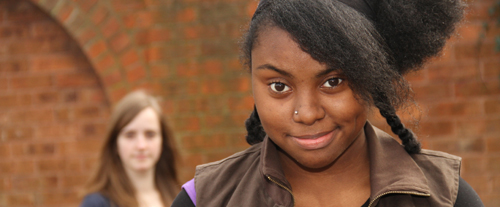Buddhism
With almost four million followers, Buddhism is the forth largest of the world's major religions. Buddhism follows the teaching of Siddhartha Gautama, the Buddha. Below are the most common Buddhist beliefs about relationships and sex.


Gender Roles
Buddhists believe that men and women are equal in their ability to reach enlightenment. They believe that men and women can help each other on that path.

Gender Roles
Buddhists believe that men and women are equal in their ability to reach enlightenment. They believe that men and women can help each other on that path.

Growing Up
There are no coming-of-age ceremonies in Buddhism. The only Buddhist initiation rite is that into monk-hood.
However, in some traditions in Burma and Thailand, boys will take novice instruction for anywhere between a week to three months. During this time they live in the temple. Children, would be expected to respect their parents and elders and take part in worship and festivals.
Growing Up
There are no coming-of-age ceremonies in Buddhism. The only Buddhist initiation rite is that into monk-hood.
However, in some traditions in Burma and Thailand, boys will take novice instruction for anywhere between a week to three months. During this time they live in the temple. Children, would be expected to respect their parents and elders and take part in worship and festivals.


Marriage
Some monks and nuns will remain celibate as a way to further their spiritual journey, by freeing themselves from sexual desire and intimacy. Other Buddhists will see marriage as ultimately a good thing because a married couple can help each other on their individual spiritual journeys.

Marriage
Some monks and nuns will remain celibate as a way to further their spiritual journey, by freeing themselves from sexual desire and intimacy. Other Buddhists will see marriage as ultimately a good thing because a married couple can help each other on their individual spiritual journeys.

Sex
The Third Precept in Buddhism states: ‘Do not indulge in sexual misconduct’. As a result, many Buddhist monks and nuns choose to be celibate their entire lives. They do this so that they can live free from the attachments of sexual desire and intimate relationships and reach enlightenment. Other Buddhists will marry. Sex is seen as something that should only be in marriage because of the emotional pain that can result from sex before and outside of marriage.
Sex
The Third Precept in Buddhism states: ‘Do not indulge in sexual misconduct’. As a result, many Buddhist monks and nuns choose to be celibate their entire lives. They do this so that they can live free from the attachments of sexual desire and intimate relationships and reach enlightenment. Other Buddhists will marry. Sex is seen as something that should only be in marriage because of the emotional pain that can result from sex before and outside of marriage.


Contraception
Buddhists believe that preventative contraception is completely acceptable because no being has yet been formed in the womb. However, there are many differing opinions within the Buddhist community on whether or not it’s acceptable to use emergency contraception.

Contraception
Buddhists believe that preventative contraception is completely acceptable because no being has yet been formed in the womb. However, there are many differing opinions within the Buddhist community on whether or not it’s acceptable to use emergency contraception.

Termination of Pregnancy
There is no single Buddhist view on abortion. Buddhists believe that life should not be destroyed and regard causing death as morally wrong if the death is caused deliberately or by negligence. Traditional Buddhism rejects abortion because it involves the deliberate destroying of a life.
Buddhists regard life as starting at conception. They believe that consciousness does not die with the death of the body but continues its life without physical form. It will eventually be reincarnated into another living form. At the point of conception, consciousness enters the womb and human life begins. Terminating a pregnancy would therefore be seen as killing a sentient being. Other factors provide points for ethical discussion. They include the age of the embryo or foetus, risks to the mother or foetus, compassion for those who have had a termination of pregnancy and encouraging responsible and appropriate forms of contraception.
Buddhists are expected to take full personal responsibility for everything they do and for the consequences that follow. The decision to abort is therefore a highly personal one. It is one that requires careful and compassionate exploration of the ethical issues involved. It also requires a willingness to carry the burden of whatever happens as a result of the decision. The ethical consequences of the decision will also depend on the motive and intention behind the decision and the level of mindfulness with which it was taken.
The Dalai Lama has said:
‘Of course, abortion, from a Buddhist viewpoint, is an act of killing and is negative, generally speaking. But it depends on the circumstances.
If the unborn child will be retarded or if the birth will create serious problems for the parent, these are cases where there can be an exception. I think abortion should be approved or disapproved according to each circumstance.’ Dalai Lama, New York Times, 28/11/1993
Core values underpinning Buddhist beliefs and codes of conduct include those found in The Ten Perfections (the qualities that lead to Buddha-hood):
- Generosity
- Good conduct/discipline
- Letting go/enunciation
- Wisdom/understanding
- Inner strength/energy
- Patience
- Honesty
- Resolve
- Loving kindness
- Equanimity
Termination of Pregnancy
There is no single Buddhist view on abortion. Buddhists believe that life should not be destroyed and regard causing death as morally wrong if the death is caused deliberately or by negligence. Traditional Buddhism rejects abortion because it involves the deliberate destroying of a life.

Buddhists regard life as starting at conception. They believe that consciousness does not die with the death of the body but continues its life without physical form. It will eventually be reincarnated into another living form. At the point of conception, consciousness enters the womb and human life begins. Terminating a pregnancy would therefore be seen as killing a sentient being. Other factors provide points for ethical discussion. They include the age of the embryo or foetus, risks to the mother or foetus, compassion for those who have had a termination of pregnancy and encouraging responsible and appropriate forms of contraception.
Buddhists are expected to take full personal responsibility for everything they do and for the consequences that follow. The decision to abort is therefore a highly personal one. It is one that requires careful and compassionate exploration of the ethical issues involved. It also requires a willingness to carry the burden of whatever happens as a result of the decision. The ethical consequences of the decision will also depend on the motive and intention behind the decision and the level of mindfulness with which it was taken.
The Dalai Lama has said:
‘Of course, abortion, from a Buddhist viewpoint, is an act of killing and is negative, generally speaking. But it depends on the circumstances.
If the unborn child will be retarded or if the birth will create serious problems for the parent, these are cases where there can be an exception. I think abortion should be approved or disapproved according to each circumstance.’ Dalai Lama, New York Times, 28/11/1993
Core values underpinning Buddhist beliefs and codes of conduct include those found in The Ten Perfections (the qualities that lead to Buddha-hood):
- Generosity
- Good conduct/discipline
- Letting go/enunciation
- Wisdom/understanding
- Inner strength/energy
- Patience
- Honesty
- Resolve
- Loving kindness
- Equanimity

Divorce
Buddhists believe in promoting peace and harmony and the lessening of pain and suffering. Because of this, Buddhists will choose the option that will bring the least harm and hurt to others, whether that is divorce or staying married.

Divorce
Buddhists believe in promoting peace and harmony and the lessening of pain and suffering. Because of this, Buddhists will choose the option that will bring the least harm and hurt to others, whether that is divorce or staying married.

Homosexuality
The Buddhist scriptures do not make any clear judgments on homosexuality. Many Buddhist scholars believe that it doesn't matter if a person is homosexual or heterosexual. This is because all people should be evaluated against the same rules of sexual misconduct.
Culturally, however, this tolerance of homosexuality does not always play out. Some Buddhists see homosexuality as a karmic punishment for sexual misconduct in a previous life.
Homosexuality
The Buddhist scriptures do not make any clear judgments on homosexuality. Many Buddhist scholars believe that it doesn't matter if a person is homosexual or heterosexual. This is because all people should be evaluated against the same rules of sexual misconduct.
Culturally, however, this tolerance of homosexuality does not always play out. Some Buddhists see homosexuality as a karmic punishment for sexual misconduct in a previous life.

